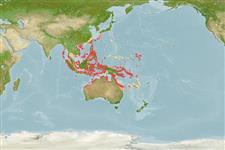Common names from other countries
>
Ovalentaria/misc (Various families in series Ovalentaria) >
Pomacentridae (Damselfishes) > Pomacentrinae
Etymology: Dischistodus: Greek, di = two + Greek, schistos = fissile stone, Plinius + Greek, odous = teeth (Ref. 45335).
More on author: Cuvier.
Environment: milieu / climate zone / depth range / distribution range
Οικολογία
Θαλασσινό(ά); Υφάλμυρο Υφαλόφιλο(α); μη μεταναστευτικό(ά); εύρος βάθους 1 - 10 m (Ref. 7247). Tropical; 32°N - 25°S, 92°E - 171°E
Indo-West Pacific: eastern Indian Ocean from the Andaman Sea, Rowley Shoals (Ref. 9710) and northwest Australia eastward to the Solomon Islands, north to China, south to the Great Barrier Reef.
Μέγεθος / Βάρος / Age
Maturity: Lm ? range ? - ? cm
Max length : 18.0 cm TL αρσενικό/απροσδιόριστο; (Ref. 48636)
Short description
Κλείδες προσδιορισμού | Μορφολογία | Μορφομετρία
Ραχιαίες άκανθες (συνολικά) : 13; Μαλακές ραχιαίες ακτίνες (συνολικά) : 13 - 15; Εδρικές άκανθες: 2; Μαλακές εδρικές ακτίνες: 14 - 15.
Adults occur in small patch reefs of shallow lagoons, with algae or seagrass habitats. The stomach of several specimens examined contained mainly algae and detritus mixed with sand grains (Ref. 7247). Oviparous, distinct pairing during breeding (Ref. 205). Eggs are demersal and adhere to the substrate (Ref. 205). Males guard and aerate the eggs (Ref. 205). Diurnal species (Ref. 113699).
Life cycle and mating behavior
Maturities | Αναπαραγωγή | Spawnings | Egg(s) | Fecundities | Προνύμφες
Oviparous, distinct pairing during breeding (Ref. 205). Eggs are demersal and adhere to the substrate (Ref. 205). Males guard and aerate the eggs (Ref. 205).
Allen, G.R., 1991. Damselfishes of the world. Mergus Publishers, Melle, Germany. 271 p. (Ref. 7247)
IUCN Red List Status (Ref. 130435)
CITES (Ref. 128078)
Not Evaluated
Threat to humans
Harmless
Human uses
αλιεία: περιορισμένης εμπορικότητας
Εργαλεία
Special reports
Download XML
Διαδικτυακές πηγές
Estimates based on models
Preferred temperature (Ref.
115969): 25.4 - 29.3, mean 28.7 (based on 2212 cells).
Phylogenetic diversity index (Ref.
82804): PD
50 = 0.5078 [Uniqueness, from 0.5 = low to 2.0 = high].
Bayesian length-weight: a=0.01479 (0.00642 - 0.03409), b=3.00 (2.80 - 3.20), in cm Total Length, based on LWR estimates for this (Sub)family-body shape (Ref.
93245).
Τροφικό Επίπεδο (Ref.
69278): 2.0 ±0.00 se; based on food items.
Ελαστικότητα (Ref.
120179): Μεσαίο(α), ελάχιστος χρόνος για διπλασιασμό πληθυσμού 1,4 - 4,4 έτη (Preliminary K or Fecundity.).
Fishing Vulnerability (Ref.
59153): Low vulnerability (10 of 100).
